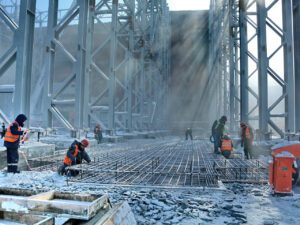
The Cabinet of Ministers approved the list of goods for 2022, the export of which requires licensing, as well as the list of ozone-depleting substances, goods and equipment from them, the export of which also requires licensing.
The government made the corresponding decision on Wednesday.
According to the draft resolution, the government established zero quotas for silver and gold, the quota for precious metal scrap was 2 tonnes.
As for the list of goods and equipment, which include ozone-depleting and fluorinated greenhouse gases, a number of drugs, dyes, paints and varnishes, cosmetics, lubricants, mixtures, etc. have been introduced.

Ukraine, in accordance with the Second National Determined Contributions of Ukraine (NOV2) to the Paris Agreement, shall reduce greenhouse gas emissions by 65% from 1990 levels by 2030.
This goal was set and approved by a resolution of the Cabinet of Ministers of Ukraine at an extraordinary meeting on Friday.
“The Cabinet of Ministers has approved Ukraine’s Second National Determined Contributions of Ukraine to the Paris Agreement. By decarbonization and the development of renewable energy sources, we intend to reduce greenhouse gas emissions to 35% of the 1990 level. Ukraine goes side by side with the EU and the United States in the fight against climate change,” Prime Minister of Ukraine Denys Shmyhal wrote on his Twitter page.
Ukraine’s initial contribution to the Paris Agreement, adopted by the Cabinet of Ministers in September 2015, aimed to reduce greenhouse gas emissions by 40% by 2030, i.e. up to 60% of the 1990 level.
The indicator of emission reduction by 65% by 2030 was obtained based on the calculation that in 1990, Ukraine’s emissions, taking into account land use and forestry, amounted to 884 million tonnes. At the same time, in 2019, according to the inventory, CO2 emissions amounted to 332 million tonnes – 37.6% of the 1990 level.
According to an explanatory note to the draft resolution of the Cabinet of Ministers, NOV2 will allow integrating environmental components into the updated development strategies of the state, taking into account the national circumstances of the development of the Ukrainian economy while implementing international obligations, and improving the image of Ukraine in the international arena and in climate negotiations.
According to the note, NOV2 will contribute to attracting additional technological and financial resources to modernize and transform the economy towards the implementation of the European Green Deal and mitigate the effects of climate change.
The document is to be submitted to the Secretariat of the United Nations Climate Change Convention in preparation for the 26th UN Climate Change Conference of the Parties (COP26), which will be held on November 1 through November 12 in Glasgow.

The Cabinet of Ministers has approved the opening of an international checkpoint across the state border at Zhytomyr airport for freight and passenger traffic with a permanent mode of functioning and round-the-clock operation.
The corresponding decision was made at a government meeting on June 30.
As noted in an explanatory note to the decision, to date, Korolev Zhytomyr International Airport state enterprise of Akkord LLC is an efficient subsidiary that can provide landing, takeoff, parking and maintenance of aircraft, passengers and cargo.

The Cabinet of Ministers of Ukraine extended quarantine in Ukraine until August 31, 2021 and established new quarantine restrictions at the Wednesday meeting, the Health Ministry’s press service has said.
According to the statement, a “green” level of epidemic danger is established throughout the country, at which the mask regime is maintained in public transport during mass events.
The work of catering, entertainment venues (nightclubs), cinemas and halls of other culture sectors, as well as other public events are allowed, provided that the mask regime is observed.

The Cabinet of Ministers of Ukraine at a meeting on Wednesday approved the systems for assessing and checking stability of the essential characteristics of construction products, which are required for declaring their performance.
According to an explanatory note to the draft resolution, the systems provided for by the document comply with the requirements set by Regulation (EU) No 305/2011 of the European Parliament and the Council of the EU.
The approval of assessment and verification systems will allow for effective quality control of construction products and their distribution in the markets.

The Cabinet of Ministers approved the decision to attract a $211 million loan from the International Bank for Reconstruction and Development (IBRD) and the Clean Technologies Fund (CTF) for PrJSC Ukrhydroenergo as part of an investment project to improve the sustainability of the integrated power system (IPS) for European integration, providing for the establishment of hybrid power generation systems, the Ministry of Energy has said.
According to the report, the decision, initiated by the Ministry of Energy, was made at a government meeting on Wednesday, although it was not on the agenda and was not discussed during the broadcast.
“To implement the project, loans will be attracted in the amount of $177 million from the IBRD and $34 million from the Clean Technologies Fund,” the ministry said.
According to the ministry, these funds will be channeled, in particular, for the installation of 197 Li ion battery energy storage systems at Ukrhydroenergo facilities, which are planned to be attracted to provide auxiliary services for frequency and power support. In addition, it is planned to install 63.9 MW of photovoltaic plants for the own needs of HPPs and PSPs and for charging the energy storage systems.
“Hybrid power generation plants based on battery storage will allow Ukrhydroenergo to provide the transmission system operator with an additional frequency regulation reserve and expand the regulating range of the automatic frequency recovery reserve required to ensure reliable operation and compliance with the operational safety of the IPS of Ukraine and good quality of electrical energy,” the ministry said.
At the same time, the Ministry of Energy said that highly maneuverable and fast-acting reserves, in terms of their parameters, have no analogues in the IPS of Ukraine.
The terms and conditions of the loans were not disclosed.
At the same time, the Ministry of Energy added that the Cabinet of Ministers approved the draft decree of the President of Ukraine on the delegation for negotiating and concluding guarantee agreements with financial institutions.
According to government resolution No. 550 dated June 2, 2021, published on the government portal, loans from the IBRD and CTF will be attracted by Ukrhydroenergo under government guarantees, the payment for which is 0.5% per annum of the selected and outstanding loan amount.